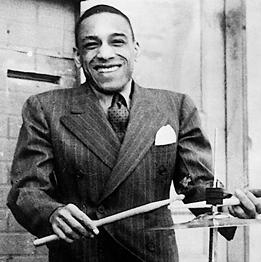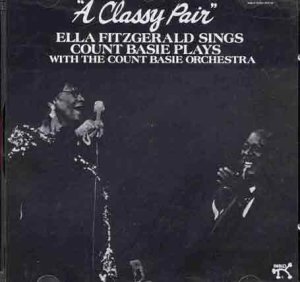Related Research Articles

Ella Jane Fitzgerald was an American jazz singer, sometimes referred to as the "First Lady of Song", "Queen of Jazz", and "Lady Ella". She was noted for her purity of tone, impeccable diction, phrasing, timing, intonation, and a "horn-like" improvisational ability, particularly in her scat singing.

William James "Count" Basie was an American jazz pianist, organist, bandleader, and composer. In 1935, he formed the Count Basie Orchestra, and in 1936 took them to Chicago for a long engagement and their first recording. He led the group for almost 50 years, creating innovations like the use of two "split" tenor saxophones, emphasizing the rhythm section, riffing with a big band, using arrangers to broaden their sound, and others. Many musicians came to prominence under his direction, including the tenor saxophonists Lester Young and Herschel Evans, the guitarist Freddie Green, trumpeters Buck Clayton and Harry "Sweets" Edison, plunger trombonist Al Grey, and singers Jimmy Rushing, Helen Humes, Thelma Carpenter, and Joe Williams.

Harry "Sweets" Edison was an American jazz trumpeter and a member of the Count Basie Orchestra. His most important contribution was as a Hollywood studio musician, whose muted trumpet can be heard backing singers, most notably Frank Sinatra.

William Henry "Chick" Webb was an American jazz and swing music drummer and band leader.
"A Tisket A Tasket" is a nursery rhyme first recorded in America in the late nineteenth century. It was used as the basis for a very successful and highly regarded 1938 recording by Ella Fitzgerald, composed by Fitzgerald in conjunction with Al Feldman. It has a Roud Folk Song Index number of 13188.

A Classy Pair is a 1979 studio album by the American jazz singer Ella Fitzgerald, accompanied by the Count Basie Orchestra, with arrangements by Benny Carter.
"They Can't Take That Away from Me" is a 1937 popular song with music by George Gershwin and lyrics by Ira Gershwin. It was introduced by Fred Astaire in the 1937 film Shall We Dance and gained huge success.

The Count Basie Orchestra is a 16 to 18 piece big band, one of the most prominent jazz performing groups of the swing era, founded by Count Basie in 1935 and recording regularly from 1936. Despite a brief disbandment at the beginning of the 1950s, the band survived long past the Big Band era itself and the death of Basie in 1984. It continues under the direction of trumpeter Scotty Barnhart.

Ella Fitzgerald Sings the Duke Ellington Song Book is a 1957 studio album by the American jazz singer Ella Fitzgerald, accompanied by Duke Ellington and his orchestra, focusing on Ellington's songs.
"Oh, Lady Be Good!" is a 1924 song by George and Ira Gershwin. It was introduced by Walter Catlett in the Broadway musical Lady, Be Good! written by Guy Bolton, Fred Thompson, and the Gershwin brothers and starring Fred and Adele Astaire. The song was also performed by the chorus in the film Lady Be Good (1941), although the film is unrelated to the musical.
"It's De-Lovely" is one of Cole Porter's hit songs, originally appearing in his 1936 musical, Red Hot and Blue. It was introduced by Ethel Merman and Bob Hope. The song was later used in the musical Anything Goes, first appearing in the 1956 film version ; in the 1962 revival where it was sung by Hal Linden and Barbara Lang, and in the 2004 biographical film De-Lovely, where it was performed by Robbie Williams.
"Too Marvelous for Words" is a popular song written in 1937. Johnny Mercer wrote the lyrics for music composed by Richard Whiting. It was introduced by Wini Shaw and Ross Alexander in the 1937 Warner Brothers film Ready, Willing and Able, as well as used for a production number in a musical revue on Broadway. The song has become a pop and jazz standard and has been recorded by many artists.

"A Fine Romance" is a popular song composed by Jerome Kern with lyrics by Dorothy Fields, published in 1936.
"Please Don't Talk About Me When I'm Gone" is a song published in 1930. It was written by Sam H. Stept with lyrics by Sidney Clare. The original publication also credited singer Bee Palmer as co-composer.
"I've Got My Love to Keep Me Warm" is a popular song copyrighted in 1937 by its composer, Irving Berlin, and first recorded by (i) Ray Noble, Howard Barrie, vocalist; (ii) Red Norvo, Mildred Bailey, vocalist; (iii) and Billie Holiday with her orchestra. The song – sung by Dick Powell and Alice Faye – debuted on film February 12, 1937, in the musical, On the Avenue.
"Baby Won't You Please Come Home" is a blues song written by Charles Warfield and Clarence Williams in 1919. The song's authorship is disputed; Warfield claims that he was the sole composer of the song.
Will Hudson(néArthur Murray Hainer; March 8, 1908 – July 16, 1981) was a Canadian-born American composer, arranger, and big band leader who worked from the mid-1930s through the mid-1950s.
"This Year's Kisses" is a popular song written in 1936 by Irving Berlin for the musical film On the Avenue (1937) and introduced by Alice Faye. Popular recordings in 1937 were by Benny Goodman, Hal Kemp, Shep Fields and by Teddy Wilson with Billie Holiday.
Gregg Field is an American record producer and musician, who has worked with many well-known artists. He is a recipient of multiple Grammy and Emmy awards.
References
- ↑ Studwell, William Emmett and Baldin, Mark (2000). The Big Band Reader . Frog, Ltd. p. 93. ISBN 978-0-7890-0914-2. Google Book Search. Retrieved on November 15, 2009.
- ↑ "Ella Fitzgerald: The Decca Years (7 of 9)".
- ↑ "The Littlest Rebel". Library of Congress . Retrieved 15 January 2021.
- ↑ Kristin A. McGee (21 July 2011). Some Liked It Hot: Jazz Women in Film and Television, 1928–1959. Wesleyan University Press. p. 104. ISBN 978-0-8195-6967-7.